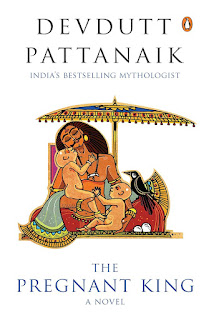Set in the backdrop of the Mahabharata and makes references to characters and incidents in the Kurukshetra as well as the Ramayana The Pregnant King is a 2008 book by Devdutt Pattanaik.
"'I am not sure that I am a man,' said Yuvanashva. 'I have created life outside me as men do. But I have also created life inside me, as women do. What does that make me? Will a body such as mine fetter or free me?' Among the many hundreds of characters who inhabit the Mahabharata, perhaps the world's greatest epic and certainly one of the oldest, is Yuvanashva, a childless king, who accidentally drinks a magic potion meant to make his queens pregnant and gives birth to a son. This extraordinary novel is his story. It is also the story of his mother Shilavati, who cannot be king because she is a woman; of young Somvat, who surrenders his genitals to become a wife; of Shikhandi, a daughter brought up as a son, who fathers a child with a borrowed penis; of Arjuna, the great warrior with many wives, who is forced to masquerade as a woman after being castrated by a nymph; of Ileshwara, a god on full-moon days and a goddess on new-moon nights; and of Adi-natha, the teacher of teachers, worshipped as a hermit by some and as an enchantress by others. Building on Hinduism's rich and complex mythology-but driven by a very contemporary sensibility-Devdutt Pattanaik creates a lush and fecund work of fiction in which the lines are continually blurred between men and women, sons and daughters, husbands and wives, fathers and mothers. Confronted with such fluidity the reader is drawn into Yuvanashva's struggle to be fair to all-those here, those there and all those in between."
Book is in Eight parts. The main characters in the book are:
Vallabhi was a small but prosperous kingdom that stood between Hastina-puri and Panchala on the banks of the Kalindi, a tributary of the Yamuna. It encircled the temple of Ileshwara who blessed Drupada, established long ago by Ila.
King Yuvanashva is the well liked ruler of Vallabhi: an obedient son, a devoted husband who aspires to be just towards all and uphold Dharma in his kingdom. The epic battle of Kurukshetra is imminent but the king's mother, Shilavati, refuses to consent to war until Yuvanashva sires an heir. Despite all efforts, no child is born, and the king seeks the help of the two Siddhis, Yaja and Upayaja. Yuvanahva seemingly unintentionally drinks the potion they craft for his wives and ends up pregnant himself. The incident is hidden from all but his wife, Shilavati and Asanga, the healer. After the child, Mandhata, is born, he successfully impregnates his second wife, Pulomi. Yuvanashva, who has lived his whole life by the code of Dharma, begins to question his gender identity and longs to be called "mother" by his son.
Woven throughout are the stories of other characters who subvert expectations for gender and sexuality. Shilavati was widowed at a young age and became regent but, as a woman, was not permitted to keep the throne. Somvat and Sumedha, two childhood friends, decide to get married despite being men. Sthunakarna, a yaksha, temporarily gives up his manhood for the prince Shikhandi. Arjuna, the great warrior with many wives, is castrated and forced to masquerade as a eunuch. Adi-natha, the teacher of teachers, is worshipped as a hermit by Yaja and an enchantress by Upayaja. Ileshwar Mahadev becomes a God on full moon days and a Goddess on new moon nights.


No comments:
Post a Comment